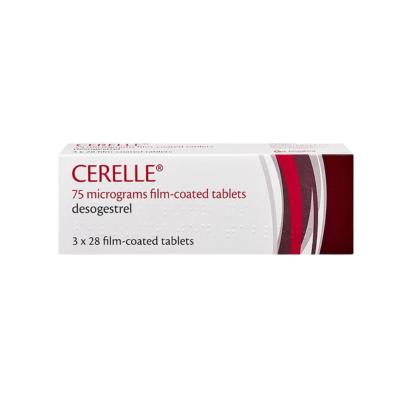Cerelle
- Highly Effective Pregnancy Prevention
- Oestrogen-Free Option
- Flexible Timing
- UK Registered Pharmacy
Cerelle
Category:Contraceptives (Combined)Cerelle is a progestogen-only contraceptive pill (mini pill) taken daily to prevent pregnancy. It contains desogestrel, which stops egg release during your cycle and is suitable for those who can't use oestrogen-based pills.
Fetching Data...
All inclusive services
No extra costs
Free tracked delivery
Delivered in plain packaging
Prescription included
No consultation charges
Frequently Asked Questions for Cerelle
What is Cerelle?
Cerelle is a progestogen-only contraceptive pill (POP), often called the “mini-pill,” used to prevent pregnancy. Unlike combined pills, Cerelle contains no oestrogen, making it an ideal choice for individuals who cannot take oestrogen-based contraception or are breastfeeding. Each tablet contains 75 micrograms of desogestrel, a synthetic hormone similar to progesterone.
How Does Cerelle Work?
Cerelle works in two key ways to stop pregnancy:
- It thickens cervical mucus, making it harder for sperm to reach the uterus.
- It prevents ovulation, stopping the release of an egg from the ovaries each month.
When taken correctly at the same time every day, Cerelle is over 99% effective in preventing pregnancy.
How to Start Taking Cerelle
-
If You’re Not on Hormonal Contraception:
- Start taking Cerelle on day 1 of your period for immediate protection.
- If you begin after day 1, use extra contraception (e.g., condoms) for the first 7 days.
-
Switching from Other Contraceptives:
- If moving from a combined pill, vaginal ring, or patch, start Cerelle straight after your last pill or removal of your device—no break required.
- If switching from another mini-pill, begin taking Cerelle at any time.
-
After Having a Baby:
- Start Cerelle between days 21–28 after childbirth for immediate protection. If you start later, you’ll need additional contraception for 7 days.
Side Effects of Cerelle
Some people may experience side effects while taking Cerelle, particularly during the first few months. The most common side effects include:
- Irregular bleeding: Spotting, no periods, or unpredictable cycles.
- Headaches and feeling nauseous.
- Mood changes: Low mood, irritability, or reduced libido.
- Acne or worsening of existing breakouts.
- Breast tenderness and mild weight gain.
Most of these symptoms improve over time. If they persist or cause concern, speak to your GP or pharmacist.
Warnings and Precautions
- Breast Cancer Risk: There is a slightly increased risk of breast cancer when using progestogen-only pills like Cerelle. The risk decreases once you stop taking it. Check your breasts regularly and contact your doctor if you notice any changes.
- Blood Clots: While rare, hormonal contraceptives can increase the risk of blood clots. Seek immediate medical advice if you experience symptoms such as swelling in the leg, chest pain, or shortness of breath.
- Liver Conditions and Other Medical Issues: Let your doctor know if you have a history of liver problems, diabetes, or high blood pressure before starting Cerelle.
- Interactions with Other Medicines: Some medications can make Cerelle less effective. Always inform your GP or pharmacist about any other treatments you’re taking.
- Pregnancy: Do not take Cerelle if you’re pregnant or trying to conceive.
- STI Protection: Cerelle does not protect against sexually transmitted infections (STIs). Use condoms alongside Cerelle to reduce your risk.
